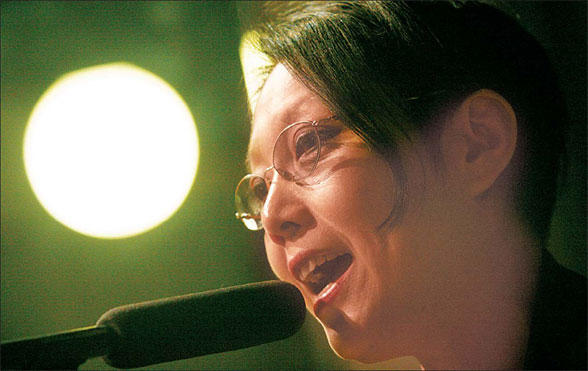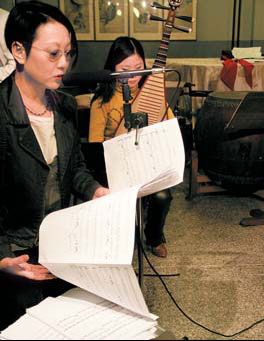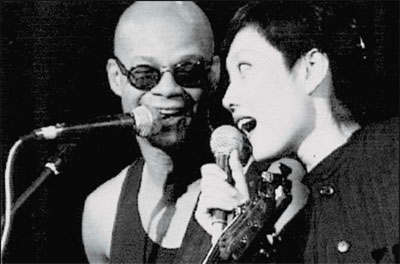Lady sings the blues
|
Liu Sola sings during a recent Beijing concert. |
On a gloomy Beijing afternoon, a Chinese woman wearing a long black silk overcoat walks into a teahouse outside Purple Bamboo Park. Sitting on a cushioned cane chair, and sipping of a chrysanthemum tea, she says to me: "I often wonder if I'm Chinese or African."
Her tone is musical, her voice full of mystique, and her eyes glint behind chic, old-style round glasses.
"Don't you believe me?" She chuckles, and her laughter resonates through the empty teahouse. We are the only customers.
Liu Sola is one of China's most mysterious musicians, authors and singers. Her physical appearance is Han Chinese but if you close your eyes, Liu becomes the embodiment of an African American blues singer.
At her recent concert in Beijing, her deep satin voice moved from breathy glissandos to animalistic yells, between her series of operatic and African-American chants.
Her singing techniques aptly adapt the vocal traditions of gospel and jazz with Asian music from northern China's folk opera Bang Zi to Japanese Noh.
|
Liu Sola with her band in rehearsal. Jiang Dong |
The New York media once acknowledged that Liu Sola was "the only Chinese artist who'd qualify to play the New Orleans Jazz Festival".
The third child and the youngest of parents of high-ranking Communist Party of China officials, Liu was born in 1955 in Beijing, and raised in the capital. However this Beijing lady claims, "I feel music, jazz to be exact, just like a black person."
Knowing how to swing is the key to jazz, Liu says. "You've got to know how to swing not just your body, but also in your music."
Swing cannot be learnt in the classroom, she says, because it is a spontaneous resonation reflecting the musician's deep feeling.
Liu's friend's Ornette Coleman, one of the major innovators of free jazz, told her that understanding swinging is the pivotal difference between one who understands jazz and one doesn't. It may sound easy, but Liu, a classically trained composer from China's prestigious Central Conservatory of Music, took a decade to get it.
Liu says she was not allowed to study modern composition at her time at the academy. During her five years of studies at the music school (1977-83), Liu composed a series of classical music pieces, including a piano suite and a symphony.
Her heart, however, was in Chinese and African-American roots-music, and her head was deeply into existentialist writers such as Jack Kerouac and J.D Salinger.
"Unfortunately," she says, "we had to do so many things we didn't want to do in order to do something we longed to do."
Since she was not allowed to use her inner voice in music, Liu turned to literature, penning many controversial novels.
When her first novel You Have No Choice (Ni Bie Wu Xuanze) came out in 1985, it created a sensation. Regarded as the representative avant-garde piece in the contemporary literature of China, the novel depicts a group of music students trapped in the same frustrating situation she experienced at the Central Conservatory. The characters don't want to be institutionalized, and rebel against authority and regulation.
The novel instantly won Liu such fame the public almost forget she was a musician until late 1990s.
Thanks to the novel, Liu got a chance to visit America in 1987 on a writing exchange fellowship. Instead of visiting popular tourist attractions, she traveled to Columbus, Memphis, Nashville and New York, where many jazz and blues giants practice their art. She was also listening to Otis Redding and Aretha Franklin. "Their music and blues struck a chord in me the first time I heard it," she says. "I suddenly discovered a part of me that is very black.
"In China, I tried hard to escape the academic restrains, but couldn't find an outlet until I heard the real music of African Americans in the United States."
|
Performing with Fernando Saunders. File photo |
In 1989, Liu visited America again. This time to the deep south of the Mississippi Delta, where she became a blues groupie, and recorded the first-ever Chinese blues song Reborn with local blues musicians.
The experience of joining underground blues musicians at humble motels and grass-roots bars was an experience that taught Liu to "pay attention to the rebellious details."
"Jazz is not pop music as many people think. Instead, it is a music form that has heavy connotations of intellectual ideology," she says. "Originally the rebellious voice of black people, through its masters, jazz gradually has brought about profound impact on intellectuals as a whole."
Through her better understanding of jazz, Liu discovered similarities to story-telling traditions between Chinese folk music and blues. To explore these similarities, Liu cut her first album Blues From the East in the US in 1994. The album is based on two Chinese classical stories: Zhao Jun Chu Sai (Married to Exile) and Shuai Qin (The Broken Zither).
The first tells a story about a Chinese Emperor's mistress of the Han Dynasty (206 BC-AD 220), who willingly married with a chieftain of Xiongnu (Hun) as a peace offering.
The latter tells of a zither player, Bo Ya, who had a friend named Zi Qi, who was the only one who understood Bo Ya's music. After Zi Qi died, Bo Ya broke his zither, and never touched it again.
"The Broken Zither is made for my mom," Liu says about her author mother, who stopped writing after Liu's father died.
"After his death, my mom refused to leave their bedroom. She wouldn't even allow others to clean the room. She was afraid the details and the smells she was familiar with would get lost in a house cleaning," Liu recalls. "For the past 14 years of her life, my mother slept on the same side of the bed. She didn't want to move a bit to the other side, as it's the side my dad slept on."
In 1996, Liu produced her second album, China Collage, in the US. Again, the album is a fusion of Chinese folk music and jazz, blues, rock'n'roll. Some music critics say Liu's work is just Chinese music gone "swing."
"That's exactly what I want in Chinese music," she says, her body swaying lightly.
When swinging, she says, "I feel air flow in a different parts of my body. I call that Nengliang - energy of life. That's what black people refer to as soul."
For the past 10 years, Liu has been striving to revitalize the roots of Chinese music by mixing them with traditional sound of other countries.
In 1997, Liu organized her band Liu Sola and Friends in New York and mated jazz, rock'n'roll with Chinese roots music. The band consisted of traditional Chinese and American jazz-rock musicians and became a cultural meeting point. In 1998, her third album, Haunts, Liu laces Chinese folk melodies with contemporary jazz and blues.
Liu has been fixated on traditional Chinese folk music since 2005 yet her exploration continues to fashion contemporary sounds from traditional Chinese instruments, and explores new vocal expressionism.
In 2006, she wrote a chamber opera, The Fantasy of the Red Queen, which is a myth about a woman winning power with the help of powerful men. The leading vocalist in the opera, Liu uses modern psychology in this opera, and mixes traditional and modern music concepts with pop music, to create a brand new piece of traditional Chinese music.
Her band performed the opera in Berlin, in collaboration with Ensemble Modern of Germany.
Compared to literature, which can control you for a while, she says, the blues gets into your blood, controlling you for the rest of your life. It helps you discover something instinctive and essential about yourself.
"Making music is like sexual activity - it's pursuing and conquering," she says. To her, the pursuit is seeking for answers. For instance, when she plays Mozart's Magic Flute, she would suddenly find herself pondering what Mozart was thinking when he composing this piece.
"What's the story behind the music?" I'd ask so then I'd go to find the answer," she says.
Liu deems that a creative artist should always have questions in his/her mind, "Through this questioning process, you capture the history behind the piece. Only when you know the things behind, can you properly interpret the piece, or at least deal with it well technically."
Currently residing in Beijing, Liu still has many unsolved questions.
To answer them, she says, "I have to constantly be on the road. Some answers you can find by reading. Some you can only get from music."
"I'm fated to throw myself into jazz and blues, which are to me a black magic. The gravity of blues is so powerful I cannot pull myself away from it."
(China Daily 03/18/2008 page18)

















